The 2021 Porter Prize
ABR is pleased to present the shortlist for the 2021 Peter Porter Poetry Prize, which this year received a record field of 1,329 entries from thirty-three different countries. Sara M. Saleh was announced the winner of this year's prize on 27 January 2021 for their poem 'A Poetics of Fo(u)rgetting'.
Congratulations to those who reached the shortlist: Danielle Blau, Sara M. Saleh, Jazz Money, Raisa Tolchinsky, and Y.S. Lee. Each of their poems is listed below. For the full longlist, click here.
The Vernal Equinox Story
by Danielle Blau
Are we not drawn onward, we few, drawn onward to new era
– a palindrome
On the twentieth of March, day & night
hung in the balance, & we
would chant our palindromes – Redder. Peep. Noon. Oh who was it I saw. Oh who
– would fold
into ash
tree shadows, till cloven
sky quivered, aswarm, & Light
spake again: Behold,
my Forms.
Then came a reckoning
for us, the indefinite – for the smoke
skinned &
vapornatured – for the reedy – for
the roily of temper, roily
of hue – as Sun, uncaging
coiled ribs, exhaled pure
vitriolage of Spring
& – once more
newly heaven-
bent on ravishment, & scour, & scraping
clean without
distinction – down-
lusted blind translucence towards us,
who clutched
the wasting
dusk cast
by burnished junipers – we few – for
splendid pestilence, sad
match, we burnt &
lumpish dust – who cherished the stalk, begetter
of shade – who picked our first-
borns’ names from
the thousand words for gray – who hymned to
without form & void, Oh Void
& formless Void – while all
around, the spindlebushes, Winter’s
shrinking nuns, by red-
blooded enormity were drawn, drawn to the brink, drawn on
to shrieking
bloom – as there
beneath, the crouched
in prayer – the blasted, the dazzleworn –
scorched wheat in wind were
our skirling limbs, who
sing: But – but it’s
us – we few out here – here – here – us now
still – we silt – we here – we water & sand – we muck – we filth – we
Matter. Yes. Behold,
our Forms.
_____________
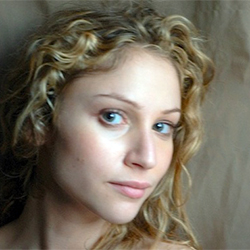 Danielle Blau’s Rhyme or Reason: Poets, philosophers, and the problem of being here now is forthcoming from W.W. Norton. Her chapbook mere eye was selected for a Poetry Society of America Chapbook Award and published with an introduction by poet D.A. Powell, and her poems won first place in the multi-genre Narrative 30 Below Contest. Poetry, short stories, articles, and interviews by Blau appear in The Atlantic, The Literary Review, Narrative Magazine, The New Yorker’s book blog, The Paris Review, Ploughshares, The Saint Ann’s Review, several volumes of the Plume Anthology of Poetry, and elsewhere. A graduate of Brown University with an honours degree in philosophy, and of New York University with an MFA in poetry, she curates and hosts the monthly Gavagai Music + Reading Series in Brooklyn, teaches at Hunter College in Manhattan, and lives in Queens. You can learn more about her at danielleblau.com.
Danielle Blau’s Rhyme or Reason: Poets, philosophers, and the problem of being here now is forthcoming from W.W. Norton. Her chapbook mere eye was selected for a Poetry Society of America Chapbook Award and published with an introduction by poet D.A. Powell, and her poems won first place in the multi-genre Narrative 30 Below Contest. Poetry, short stories, articles, and interviews by Blau appear in The Atlantic, The Literary Review, Narrative Magazine, The New Yorker’s book blog, The Paris Review, Ploughshares, The Saint Ann’s Review, several volumes of the Plume Anthology of Poetry, and elsewhere. A graduate of Brown University with an honours degree in philosophy, and of New York University with an MFA in poetry, she curates and hosts the monthly Gavagai Music + Reading Series in Brooklyn, teaches at Hunter College in Manhattan, and lives in Queens. You can learn more about her at danielleblau.com.
A Poetics of Fo(u)rgetting
by Sara M. Saleh
i.
I forget tradition, a tray of sticky dates passed around the kitchen table, bismillah
in our mouths before we ravenously break the dusk, chew and spit back the pits. Ma ladling
lumpy lentil soup, abandonment pouched in her long sleeves, an old injury she does not
stop pressing. How are we still here? Made of garlic breath, violent affection, arrears.
Ma pushes, alhamdullilah for these bounties, we are blessed, girls.
These pleasantries,
these communal myths we tell to spare each other.
ii.
I forget how I cannot see the stars, how the barbecued smoke eats at the sky, how we
elbow our way through chattering heads congealed in every crack on Haldon. I cannot
see the sidewalk, but I hear it – Sahlab! Sahlab! Mustachioed men in red tarbooshes
summon us beneath strings of plastic crescents – dangling babies shriek parents into
surrender – a siren wails somewhere. This evening orchestra. My sisters dervish and
droop: shiny baubles, painted gold lids and hips, desires too big for the lives that chose
them. Ma says, this love is haram, so we learn to keep our distance. Together we
remember the Lord.
These celebrations,
these distractions we share to comfort one another.
And naming those who stray will not bring them back in any religion.
iii.
I forget how our Lebanon made its way to Lakemba. Mothers of disappeared sons wait;
they hold up headscarves like white flags, like nooses; war wants us even in peacetime.
These Muslim dogs, these ragheads, chalk outlines and choppers crawling low. Our loss
barely literate. We pretend not to notice, this neighbourhood is an obituary.
These farewells,
these griefs we silence so we do not set ourselves on fire.
iv.
I forget how I awaken in the arms of another. How there are no muezzins interrupting
dawn, only this tango of breaths and gasps. How I have dared to worship in a language
that is not Arabic, how I tried to scrub and scrub ma’s beauty spots off my face. You are
devoted to them, to this altar of soft, turmeric skin and sadness. I shake the shame out of
my curls, I dip into the surge, the stagger, the rapture and the rupture. The din – it ruined
me, it split my god. I want to pray, but I cannot recall the verses.
These divinations,
these transgressions, so I do not forget
every lonely night that ever was.
_____________
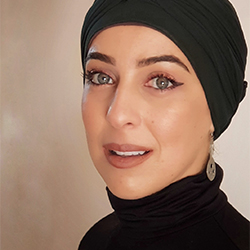 Sara M. Saleh is the daughter of migrants from Palestine, Egypt, and Lebanon, living and learning on Gadigal land. A human rights activist, community organiser, and campaigner for refugee rights and racial justice, she has spent over a decade in grassroots and international organisations in Australia and the Middle East. A poet and writer, Sara’s pieces have been published in English and Arabic in SBS Life, Australian Poetry Journal, Meanjin, Cordite Poetry Review, Bankstown Poetry Collections, and the Sweatshop Women’s Anthology: Volume II, and global anthologies Making Mirrors, Solid Air: Australian and New Zealand Spoken Word, and A Blade of Grass, alongside internationally renowned Palestinian poets Fady Joudah and Naomi Shehab Nye. Sara is co-editor of the recently released anthology, Arab-Australian-Other: Stories on Race and Identity. She is currently developing her first novel as a recipient of the inaugural Affirm Press Mentorship for Sweatshop Western Sydney. Sara is a proud Bankstown Poetry Slam 'Slambassador’.
Sara M. Saleh is the daughter of migrants from Palestine, Egypt, and Lebanon, living and learning on Gadigal land. A human rights activist, community organiser, and campaigner for refugee rights and racial justice, she has spent over a decade in grassroots and international organisations in Australia and the Middle East. A poet and writer, Sara’s pieces have been published in English and Arabic in SBS Life, Australian Poetry Journal, Meanjin, Cordite Poetry Review, Bankstown Poetry Collections, and the Sweatshop Women’s Anthology: Volume II, and global anthologies Making Mirrors, Solid Air: Australian and New Zealand Spoken Word, and A Blade of Grass, alongside internationally renowned Palestinian poets Fady Joudah and Naomi Shehab Nye. Sara is co-editor of the recently released anthology, Arab-Australian-Other: Stories on Race and Identity. She is currently developing her first novel as a recipient of the inaugural Affirm Press Mentorship for Sweatshop Western Sydney. Sara is a proud Bankstown Poetry Slam 'Slambassador’.
bila, a river cycle
by Jazz Money
this is what became of the river
who rose up
and called them-self human
stepped upon the land
containing the memories of snow melt and well spring
smooth worn stones along their ribs
and with water curiosity sought to know more about the humans on the land
whose invasion of the waters choked the river
bila never sleeps for forwards for foreverness
for flow and gift and on and on …
and yet has become stagnant with
cruel touch a non touch and toxic intervention
dams rise where new humans demand
and irrigation sucks dry
to nourish not the plants of this land but those with poisonous intent
yes the pesticides and all those carried in canola yellow plastics
in turn run this and that towards once sweet water and so
bila is transformed to the one you see today
here la look la
to water not clear with flow and laughing bodies
small mouths and delicate fronds
but a sludge of gasping fish carp muck cow shit
don’t drink from here no more no good
and when rain returns a moving sick comes across the land
but a river is always a river ey even when submerged
even dispelled even poisoned or damned
cos spirits walk this land and ancestors placed bila
just so with cause of course
(ngarradan watched) (bilbi and budharu and dinggu watched)
(even bunyip waawii had not seen rivers walk upon two feet in this world)
and so
not dripping as the fish that leaps
but as a mist will rise from a dry river so the mist turns solid rain
so bila became a human
skin shimmering a cool flesh green
walks tumble glide over rocks
or else some misted enormity
fish swim under skin
dangur flash of scale
along veins wrist and throat
yabi out of sight under
a lover can see in still morning light tails fins scales
dawn moon reflected in muck around
dropped branches collecting decaying
damp cool flesh with the grey mud smell
but a river can learn it all and still
must flow on and on to new mist and like the delta
where all is fertility and possibility
bila seeks the mangrove to clear the silt cycle
to move towards the sea
to dive into a world known as kin but always one hard to hold
to flow out and out to be reimagined as rain
and rejoin the lands of all rivers
of all stars
welcomed again into bilabang
1) bila – river | 2) ngarradan – bat | 3) bilbi – bilby | 4) giralang – the stars | 5) dinggu – dingo | 6) waawii – bunyip | 7) dangur – catfish | 8) yabi – yabby | 9) bilabang – a pool of water cut off from the river / the galaxy that contains our solar system, the ‘Milky Way’
_____________
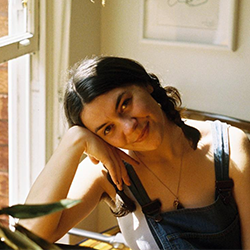 (photograph by Natalie Ironfield)Jazz Money is a poet and filmmaker of Wiradjuri heritage, currently based on the beautiful sovereign lands of the Darug and Gundungurra nations. Her poetry has been published widely and reimagined as murals, installation, and film. Jazz is the 2020 winner of the David Unaipon Award from the State Library of Queensland, and her début collection of poetry is forthcoming from University of Queensland Press in 2021.
(photograph by Natalie Ironfield)Jazz Money is a poet and filmmaker of Wiradjuri heritage, currently based on the beautiful sovereign lands of the Darug and Gundungurra nations. Her poetry has been published widely and reimagined as murals, installation, and film. Jazz is the 2020 winner of the David Unaipon Award from the State Library of Queensland, and her début collection of poetry is forthcoming from University of Queensland Press in 2021.
before dawn, with the street
lamp’s beam across your face
by Raisa Tolchinsky
if you’ve dreamt you’ve dreamt of red
an open palm an ocean which takes you swinging
your legs out of bed bruised as if with hammers
packing your bag with the lights off putting things that don’t
belong: butterfly wing, lock of hair, opal rattle
of your mind: you ask for help, you pray
to spell your own name with biceps, shoulders,
breath & if the sky looks like a wound,
what does that say about you? it’s blue
as your upper thigh as the sun rises & lowers
you down the subway’s wet steps:
sour of urine, puddled rain, everything a cave
a grave of you & construction workers:
the midnight shift coming home,
eying your pink boxing bag – you wear it like a badge
of honor, a bulletproof vest in the train filled with birds,
now the sky the lightest pink.
now you are not a girl walking through the park,
but a myth of in-between preparing for an ending
bell then a (get up, who said you could rest) – the door
of the gym broken, shattered
with glass as you write down your name, flat clipboard: I was here, again
down the stairs to the basement covered in posters of men
with rutted faces, some of them still alive
with the sound of hard-work happening before you see it:
thwack of mitt against pad, hard breath, jump rope stinging
linoleum, & the bell that never turns off, sweet swinging silver
pendulum that will keep ticking even after you quit
though you haven’t quit yet – the rest of the girls are in the ring
already but you’re late on purpose, you’re afraid
you’re afraid of too much time inside – How you doin, Queen of Roses,
Rodrick says, famous coach who asked what your name meant
& you told him, though you almost lied – Queen of roses, roses, roses –
two doors in the locker room keeping the sounds out – Where are your thorns?
Sometimes Mia is there, or Alex, smelling like expensive perfume.
They bring their own hairdryers, lipstick, powder. Ponytails smoothed
back, scuffed boxing shoes, lace under everything until they armor
up & strap down. Mia always shows her 6 pack (the coaches are bored,
she says, entertain them from far away
& they’ll leave you alone) – but you pull
your hoodie over your headphones, tie your shoes tight.
jump rope, headgear, hand-wraps –
Good luck out there, Andy says, winking.
She’s got a 3 year old she brings in
to watch her spar – Watch what mommy does,
you’re next, next, the jump rope, 3 rounds, but you trip
when Marco comes over & says will you go on a date with me?
& you say Marco, no a thousand times no but he circles as you double-under
cross-over & whip yourself with rope & Rodrick yells, Marco, leave her alone
while you drop into a plank, planking until Cristian puts a foot on your back
& says Stay strong, 2 minutes left, & the burning, & Cristian’s foot
pressing down – so (you choose this, don’t you?)
when you finally get up to shadowbox, you punch the air so hard
you hear a whistling & What you so angry about, girl,
another coach asks from across the room & you smile
whenever they speak to you: Do you have a boyfriend?
What do you do for work? How many rounds? – easier
to give away nothing but teeth in a land
of sweat & leather & sewage; ten rounds on the heavy bag with two
kinds of pain, dull & hot. you feel both,
& time stretches until your shoulders give.
oh, bells. The Gatorade red as blood.
the locker room, emptied.
you catch your breath, watch your red
face in the mirror. Swipe of lipstick & a pencil skirt,
heels and perfume. soon you’ll pour water for business men
as they lunch. you’ll smile & ask, how can i help you?
you’ll hide (hide them!) your scabbed hands.
_____________
 Raisa Tolchinsky is a poet, editor, and teacher. She has previously lived and worked in Chicago, New York, Italy, and Iceland, and she is trained as an amateur boxer. Raisa received her BA in English Literature and Italian Studies from Bowdoin College and the University of Bologna. Currently, Raisa is a Poe/Faulkner fellow in poetry at the University of Virginia. More of her work can be found at www.raisatolchinsky.com
Raisa Tolchinsky is a poet, editor, and teacher. She has previously lived and worked in Chicago, New York, Italy, and Iceland, and she is trained as an amateur boxer. Raisa received her BA in English Literature and Italian Studies from Bowdoin College and the University of Bologna. Currently, Raisa is a Poe/Faulkner fellow in poetry at the University of Virginia. More of her work can be found at www.raisatolchinsky.com
Would You Rather
by Y.S. Lee
Fly or be invisible?
asks my son.
Cranes glide over the Himalayas
at inconceivable heights.
Even muffin-plumped mallards
commute in domestic convoys
a thousand metres above our heads.
You’d have to be a little dead
inside not to choose the sky.
Yet invisibility was always the goal.
As a child, I lived by its rules.
Never speak Teochew in public.
Shampoo the garlic funk from your hair.
Cringe at your mother’s voice, plangent
in any room, full-time fortissimo.
Stand a little further from her every year.
I squandered over half my life in the quest
to be good: crouched like prey, all thunderous
pulse and terror-tamed muscles, striving
for perfect camouflage in this country
that would scope out, then scoop out, my heart.
Later, I grasped that good meant White.
By then, my body was the shape of apology.
My white-passing kid is very interested
in his Chineseness, I tell a friend. Her eyebrows
leap high. Well, she says, at last. That’s progress.
Like winning the lottery but keeping your day job,
I think, though I’d never say that aloud.
I can identify all the selves I despise, recant
all the banana jokes I ever cracked. Still.
Do I have to choose? I ask my son.
He grins, like the answer is easy.
_____________
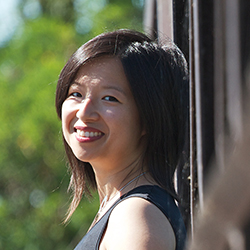 (photograph by Scott Adamson)Y.S. Lee’s fiction includes the young adult mystery series The Agency (Candlewick Press/Walker Books), which was translated into six languages and has either won or been shortlisted for various prizes. In July 2020, her poem ‘Mr. T in Your Pocket’ won Arc Poetry Magazine’s monthly Award of Awesomeness. She lives in Kingston, Ontario, Canada, within traditional Anishinaabe and Haudenosaunee territory.
(photograph by Scott Adamson)Y.S. Lee’s fiction includes the young adult mystery series The Agency (Candlewick Press/Walker Books), which was translated into six languages and has either won or been shortlisted for various prizes. In July 2020, her poem ‘Mr. T in Your Pocket’ won Arc Poetry Magazine’s monthly Award of Awesomeness. She lives in Kingston, Ontario, Canada, within traditional Anishinaabe and Haudenosaunee territory.







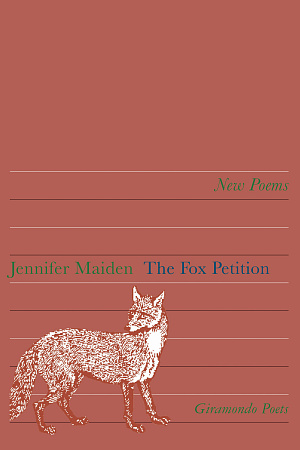
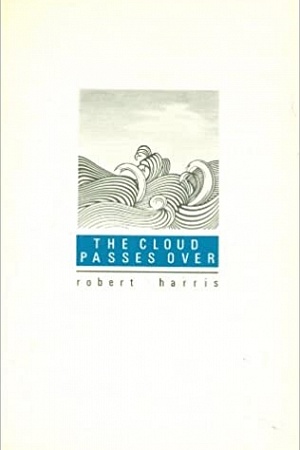
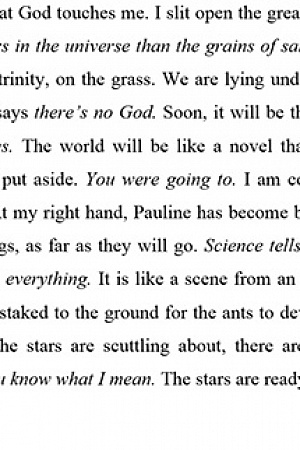
Leave a comment
If you are an ABR subscriber, you will need to sign in to post a comment.
If you have forgotten your sign in details, or if you receive an error message when trying to submit your comment, please email your comment (and the name of the article to which it relates) to ABR Comments. We will review your comment and, subject to approval, we will post it under your name.
Please note that all comments must be approved by ABR and comply with our Terms & Conditions.